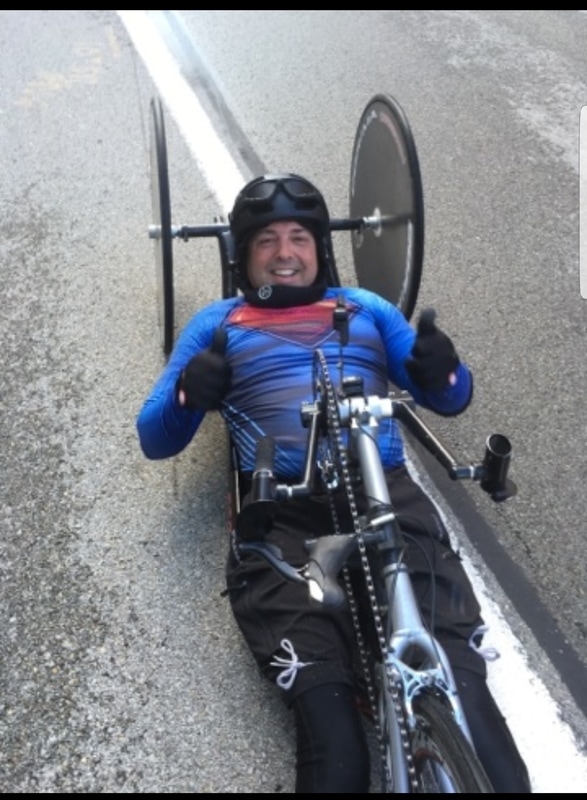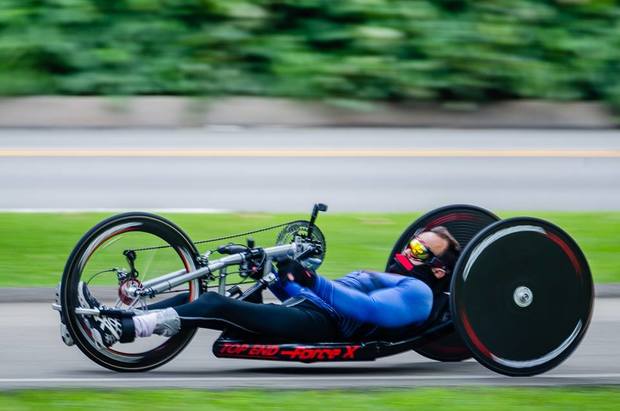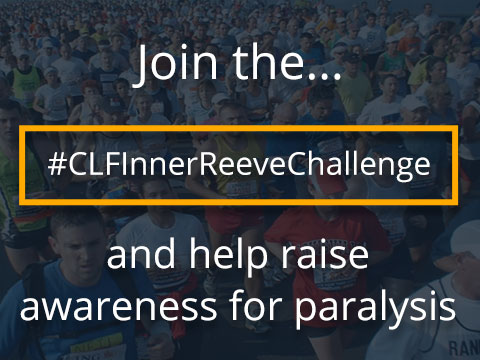On September 22, 1993, Attila Domos, now age 51, suffered a falling accident that left him paralyzed at T11-T12 (the waist) on the same night he and his former rock band, Big Bad Wolf, signed a recording contract. Attila was always an athlete (water polo, soccer, basketball, football), and then he became a musician, but he always wanted to be an athlete.
After the accident, Attila got into power lifting. He even won States in his weight class in 1997/1998, but he got tired of eating so much to keep up with it. Attila continued to lift and workout. Then his friend, a pushrim bike athlete, suggested Attila try it. He completed the Cleveland marathon in 2006 using a pushrim, but realized his body type was not fit for that type of bike. His friend suggested that Attila try Handcycling instead. “I literally took to it like fish to water”, Attila says.
He went on to win the 2010 marathon by over 11 minutes! No wonder why Attila has named his current handcycle “The Beast”! Unfortunately, Attila came down with skin breakdown issues after the race, and it got so bad that he was bedridden for 3 ½ years.

Understandably, this took a toll on Attila’s mental state. But, Attila would not back down and he started to devise a plan. He wanted to be the first paraplegic to swim across the Atlantic. He would need a ship and crew of a dozen people and said, “If I am ever getting out of here, I’m going to do something huge.”
Attila was cleared to exercise in February of 2014. His first race back, Attila encountered another medical hurdle, so he did not achieve the results he wanted. Then, he got into the Dirty Dozen, an intense bike race over Pittsburgh’s 13 steepest hills. Attila was introduced to Danny Chew – a world class cyclist, known as the “Million-Mile Man". The world record for a 24-hour handcycle race is 403.8 miles and Attila is determined to beat it. Attila was successful on his first attempt, in August 2016, Attila “unofficially” broke the handcycling world record, by cycling 407.7 miles!
On September 4, 2016, while riding in Ohio, Danny suffered a bike accident and became paralyzed from the chest down. Danny and Attila have been close friends ever since, and now Attila is the mentor. Roles were ironically reversed.
In 2018, Attila attempted the world record again at the Uber test track in Pittsburgh, PA, but the fact that he did not know the course, coupled with it not being set up the way he wanted, led to another unsuccessful attempt. Attila is scheduled to attempt to officially break the world record at the Uber test track from noon to noon on Oct 12th and 13th, 2019! Attila now knows how he needs to set up the course and himself for success. He has a strong Team behind him consisting of a crew, mechanics, and a massage therapist.
Attila says he gets through the physical and mental suffering in connection with the race by tapping into his oppositional defiance personality and his desire to prove everyone wrong. Attila thinks of the pioneers in the wild west and says, “If those people can deal with all that, then I can deal with this.”
With respect to nutrition during the race, Attila advises that it’s impossible to eat because it would be like doing stomach crunches while eating. “The biggest problem with a handcycle is bloating [gas]. I will look more pregnant as the race goes on.”

Attila has not worked with The Christopher & Dana Reeve Foundation, but is aware of Christopher’s story. Christopher Reeve was paralyzed 10 months after Attila. Interestingly, Attila has never lost a race wearing his Superman shirt! He is 3-0 and is hoping to make it 4-0 by crushing the world record. “I was a huge fan of Christopher Reeve growing up. How could you not be drawn to Superman?”, Attila says.
From Attila’s perspective, no one cared about spinal cord injuries until Christopher Reeve was paralyzed. He was in front of Congress being an activist and made a huge difference with respect to the media because it was hard to get them to care and they can often misrepresent spinal cord injuries. They want to do stories to make a hero out of someone who came back from their injuries; but absent advancements in medicine unfortunately make recovery few and far between. However, Attila worked afterhours at rehab trying to regain the use of his legs, and never believed for a second that he could not make a comeback. Although Attila never backed down, it didn’t happen for him.

Attila’s mission is that he wants the media to better understand spinal cord injuries and accurately describe the difficulties they face. “People with paralysis don’t have a choice about it and it is not as simple as working harder toward recovery,” Attila said. “If the press were to focus on the need for research instead, this could actually help find a cure and make people more educated about living with paralysis,” said Attila. For now, Attila advises, “Whatever you do in the first 6 months to 1 ½ years after an injury, that is unfortunately it for most. We need more support for today’s care, and tomorrow’s cure, from everyone like what the Reeve Foundation and the Chaffin Luhana Foundation are doing,” Attila said.
“It is really hard to get excitement for anything in Pittsburgh other than the Steelers, Pirates and Penguins.” Attila says. In fact, Attila has been trying to challenge the players to a race! “People think handcycling is easy until we challenge them to a lap or two and they can’t do it.”
Attila, on the other hand, CAN do it and WILL do it on Oct 12th and 13th! Make sure to tune into his Live Feed on his Facebook page if you want to watch!
Attila is always up for a Challenge, and to support today’s care and tomorrow’s cure, Attila took on the #CLFInnerReeveChallenge, and recognized on social media two heroes who have inspired him. To learn about Attila’s heroes and see his video talking about them, visit his Facebook page or watch below.
Author: Rebecca Pascarell
Rebecca Pascarell is an attorney working with the Chaffin Luhana Foundation who is dedicated to Peloton cycling and endurance sports. She is an advocate for various causes/organizations, including The Reeve Foundation, The American Heart Association and The American Stroke Association.

